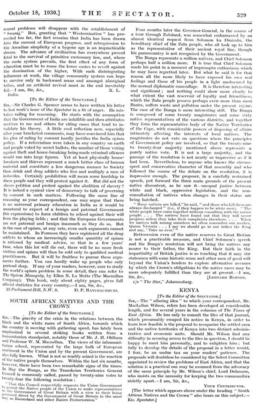[To the Editor of the SPECTATOR.]
gut,—Sir Charles G. Spencer seems to have written his letter to last week's issue of the Spectator in a fit of anger. He mis- takes railing for reasoning. He starts with the assumption that the Government of India are infallible and then attributes motives to me and others for citing cases that tend to in- validate his theory. A little cool reflection now, especially after your bracketed comments, may have convinced him that his plea of ruling by consent hardly justifies the India opium policy. If a referendum were taken in any country on earth and people voted by secret ballots, the number of those voting against theft and house-breaking being made criminal offences would run into large figures. Yet at least physically house- breakers and thieves represent a much better class of human material and constitute a less dangerous menace to Society than drink and drug addicts who live and multiply a race of imbeciles. Certainly prohibition will mean some hardship to these people and they will protest against it. But did not the slaves petition and protest against the abolition of slavery ? It is indeed a cynical view of democracy to talk of governing by consent in such matters. Following the same line of reasoning as your correspondent, one may argue that there is no universal primary education in India as it would be unnatural to expect of a benign and paternal Government (his expressions) to force children to school against their will from the playing fields ; and that the European Governments are not paternal and benign inasmuch as they do so. But in the case of opium, at any rate, even such arguments cannot be maintained. In Formosa they have registered all the drug addicts to whom an increasingly smaller quantity of opium is rationed by medical advice, so that in a few years' time, when this lot will die out, there will be no more fresh victims and opium will then be sold only to qualified medical practitioners. But it will be fruitless to pursue these argu- ments further. You can hardly wake up people who only pretend sleep. If any of your readers, however, care to study the world's opium problem in some detail, they can refer to The Opium Monopoly, by Ellen N. La Motte (The Macmillan Company). This book, only about eighty pages, gives full official statistics for every country.—I am, Sir, &c.,
























































 Previous page
Previous page